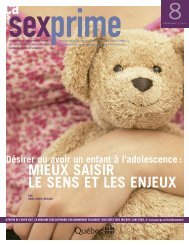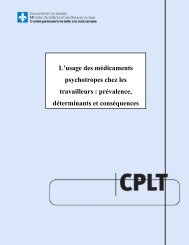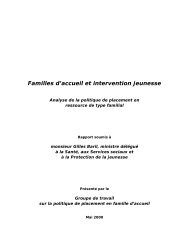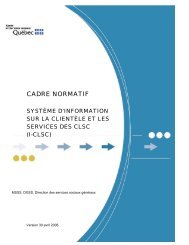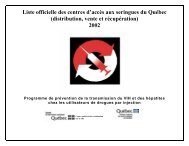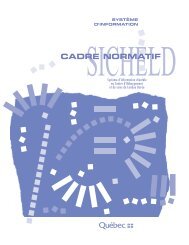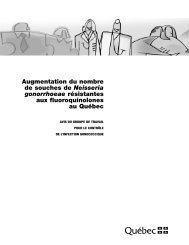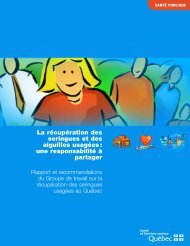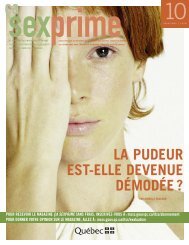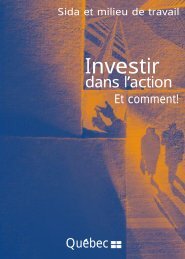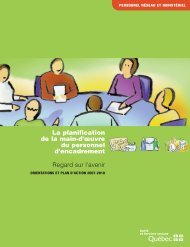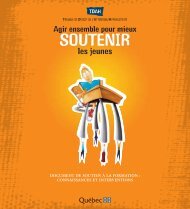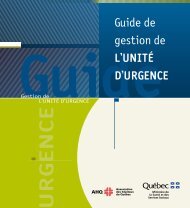De l'innovation au changement - Gouvernement du Québec
De l'innovation au changement - Gouvernement du Québec
De l'innovation au changement - Gouvernement du Québec
Create successful ePaper yourself
Turn your PDF publications into a flip-book with our unique Google optimized e-Paper software.
Projet 19<br />
<strong>De</strong>velopment and Evaluation of Cultural Consultation Service in Mental Health, région de Montréal<br />
Développement et évaluation d'un service de consultation culturelle en santé mentale<br />
3.3 Objectifs de l’évaluation The CCS Project was designed to evaluate the impact of cultural consultation, to clarify its role and effectiveness, and to compare different<br />
models of implementation.<br />
Service I : The specific goals of this evaluation were: 1) to document the process of developing the service; 2) to identify gaps and barriers to<br />
care in the general health care system; 3) to identify the types of cultural formulation used by consultants; 4) to evaluate the client satisfaction,<br />
recommendation concordance and clinical outcomes of the intervention.<br />
4. PROCESSUS DE MISE EN ŒUVRE<br />
4.1 Modalités de mise en oeuvre Aucune information à ce sujet<br />
4.2 Enjeux ou défis posés par<br />
l’innovation<br />
Service II : The overall goals of the evaluation of the MCH program were to draw out the specificity and limits of a transcultural approach in<br />
child psychiatry and to outline the eventual contribution and the transferability of this specific vision to intervention in health, social service and<br />
school milieus. The specific goals were: 1) to describe the clinical population of the Transcultural Clinic and document the evolution of<br />
treatment modalities and outcomes; 2) to analyze the modes of conceptualization and intervention employed in complex cases of tr<strong>au</strong>ma and<br />
first episode psychosis followed by the clinic.<br />
Service III : Accordingly, the aim of the evaluation was to better understand the perspective of patients who received treatment at the<br />
Jean-Talon clinic with this extended group psychoanalytic model. The goal was to identify the acceptability and impact of the intervention from<br />
the patient’s point of view.<br />
Aucune information à ce sujet<br />
4.3 Conditions favorables ou facilitantes Service I : Most clinicians requesting consultations had heard about the service through word of mouth, and the rate of referrals gra<strong>du</strong>ally<br />
increased over the course of the project.<br />
Presentations to clinical services by CCS team members also increased awareness of the service and its usefulness.<br />
4.4 Obstacles Service I : The cases represented an enormous diversity of countries of origin, languages, ethnocultural groups and religions. This demanded<br />
a wide range of consultants, interpreters and culture brokers.<br />
Bec<strong>au</strong>se it was not usually possible to find a skilled clinician with the requisite language skills and cultural background knowledge, it was often<br />
necessary to use 2 to 3 consultants to address the specific cultural and mental health issues raised by a case.<br />
It was possible to find appropriate resources to con<strong>du</strong>ct the consultation in most cases. However, ethnic matching was very approximate and it<br />
was particularly difficult to find psychiatrists and child psychiatrists with skills needed to work with specific patients.<br />
Patients were sometimes reluctant to meet with a culture-broker or consultant from their own background bec<strong>au</strong>se the small size of the local<br />
community made confidentiality impossible to maintain.<br />
The same concerns about confidentiality applied to the use of interpreters <strong>du</strong>ring the consult. Given that the CCS strictly used interpreters<br />
from the Régie régionale, the rules of confidentiality were clearly in place. Patients needed to be reassured about what this would mean.<br />
Similarly, sometimes clients who were seeking asylum expressed concern about how information gathered <strong>du</strong>ring a cultural consultation might<br />
affect their application for a refugee status.<br />
98



